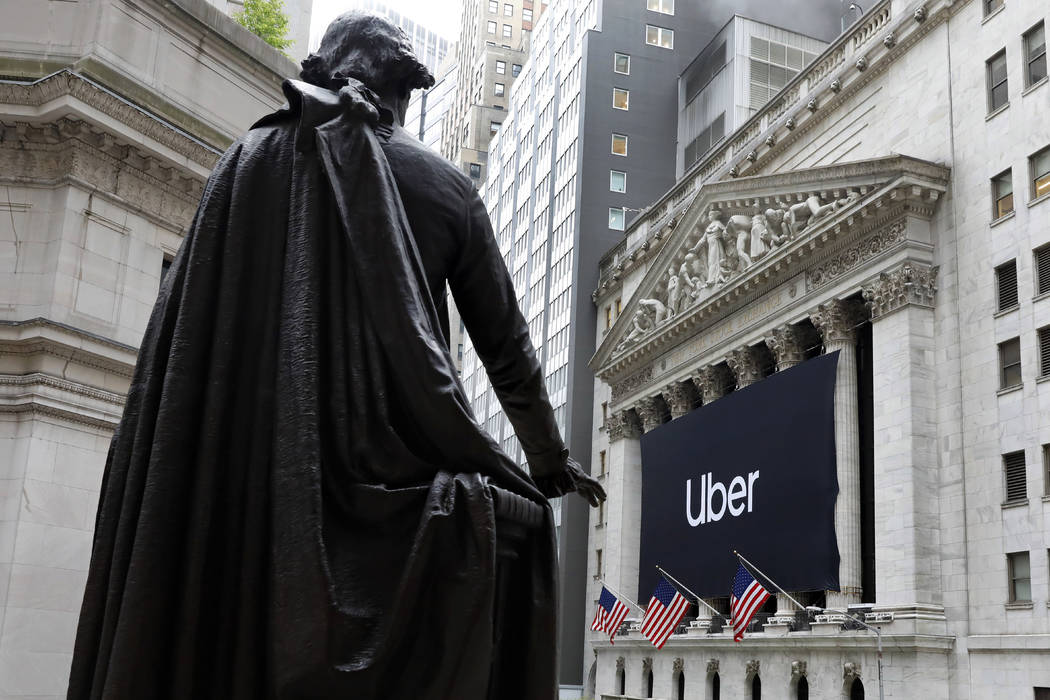Trade war escalation sends markets to worst week of ‘19
NEW YORK — An escalating trade war between the U.S. and China pushed stocks lower for a fifth straight day Friday on Wall Street and put the market on track for its worst week of the year.
The U.S. pulled the trigger on higher tariffs on $200 billion worth of Chinese goods even as both sides continued to negotiate. President Donald Trump said in a tweet Friday morning that “there is absolutely no need to rush” on making a deal.
Technology and industrial stocks had some of the biggest declines as investors fled to lower-risk holdings liked utilities and real estate stocks. Several companies with substantial revenue in China fell. Apple fell 2.4% and Micron lost 2.7%. Boeing shed 1.2% and Caterpillar fell 1.5%.
The higher tariffs from the U.S. and China’s response that it would take “necessary countermeasures” rattled investors who had been hoping for a quick resolution to the dispute. Confidence in that outcome had eased investors’ concerns this year, along with a more patient Federal Reserve and solid economic data. It all added up to help push stocks to their hottest start to a year in decades.
The sharp decline this week ramped up the volume on what has been a mostly muted year with no major market-moving news. Investors have been cautiously watching corporate earnings, but have been mostly surprised by solid results.
The trade war has already stressed consumers and companies with higher costs on goods. The latest tariff increase raises tariffs from 10% to 25% on $200 billion of Chinese imports. Trump has signaled that he might expand penalties to all Chinese goods shipped to the U.S.
KEEPING SCORE: The S&P 500 index fell 0.5 percent as of 12:40 p.m. The broad index is on track for its worst week of the year and has given back all of its gains from April. It’s still up 13.8% for the year.
The Dow Jones Industrial Average fell 0.5%, or 120 points, to 25,673. It was down as much as 358 earlier. The technology heavy Nasdaq fell 0.8%.
HELLISH WEEK: The market’s gains this year had been slow but steady up until this week. Prior to this week, the S&P 500 only had four losing weeks this year, most of them minor. Other than that it’s been mostly up. The benchmark index clocked five weeks of gains of 2% or more so far in 2019, and eight smaller weekly gains.
The slump this week has been especially hard on technology stocks, which have far outpaced the rest of the market this year. Those companies do a lot of business in China and would stand to lose greatly if the trade war drags on.
The Nasdaq index, which is heavily weighted with technology stocks, is on track to lose 3.9% for the week after an even stronger run this year than the S&P 500. The weekly drop would be only its third this year and the biggest since late December. The Nasdaq is still up 18.3%.
UBER SKIDS: Uber, the most anticipated stock offering of the year, landed with a flop on Wall Street. The stock of the giant ride-hailing company dropped as low as $41.06 in very heavy volume shortly after trading opened, well below its initial offering price of $45 a share. That price was already at the low end of its targeted price range. In early afternoon trading it was down 1% at $44.48.
Investors are cautious about Uber after its main rival, Lyft, had a rollercoaster stock market debut last month. Lyft initially surged well beyond its IPO price, but then slumped on its first full day of trading. That stock is currently trading at $53.53, well below its IPO price of $72.
MANAGEMENT REBOOTING: Symantec plunged 13.4% after the CEO of the security software company resigned abruptly.
Greg Clark has been CEO since 2016. He will be immediately replaced on an interim basis by Richard S. Hill, a current member of the board and a former CEO of Novellus Systems.
The company gave no explanation for the abrupt change in leadership. It also reported weak revenue for the first quarter and gave investors a weak profit forecast for the current quarter.
GOOD APPRAISAL: Zillow rose 6% after the real estate website operator reported a surge in first quarter revenue that narrowed its losses. The revenue boost came mainly from the company’s push into home purchases and sales. The results beat Wall Street forecasts.
WYNN LOSES: The casino operator fell 5.3% after its revenue fell short of Wall Street forecasts. Wynn reported a decline in revenue from its key properties in the Chinese gambling haven of Macau.

























